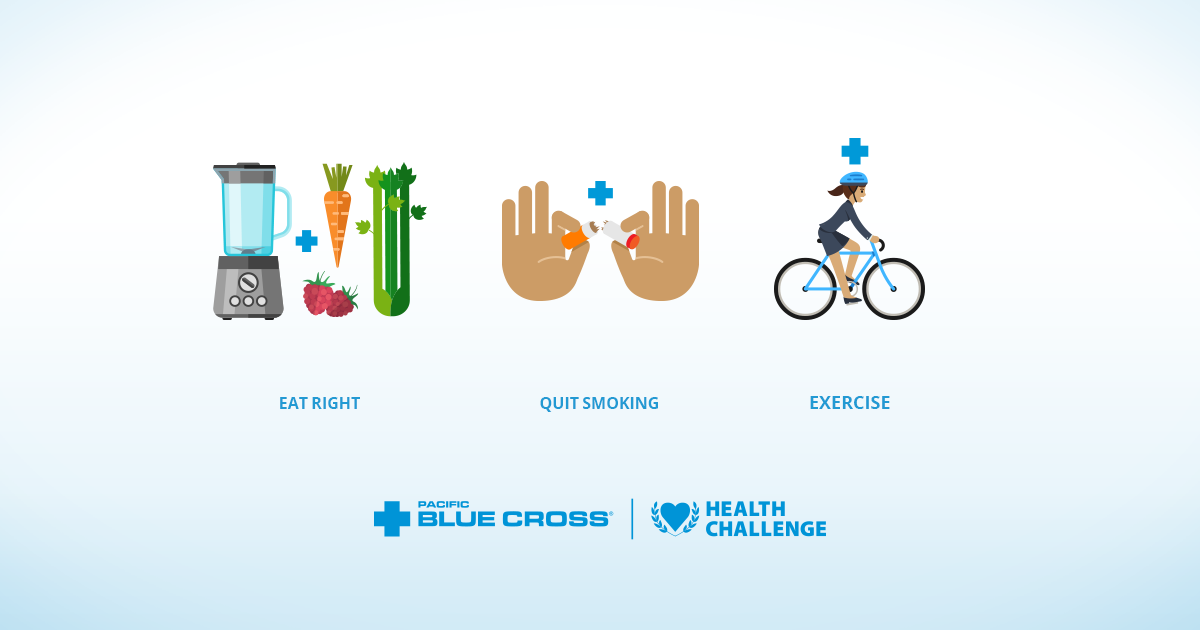If you’re carrying some extra weight after the holidays and wishing you had passed on the craft beer advent calendar and the second (or third) helping of turkey, you’re not alone. According to a study published last year in the New England Journal of Medicine, weight gain peaks over the Christmas season. And “although up to half of holiday weight gain is lost shortly after the holidays,” the authors write, “half the weight gain appears to remain until the summer months or beyond.”

The new year is a great time to hit the reset button and focus on healthy habits. Want to stick to your 2018 health resolution? Pacific Blue Cross, British Columbia’s No. 1 health benefits provider, is here to help with a social media health challenge based on setting a tangible goal and sharing it. You’ll feel better and you may even prevent chronic diseases, such as Type 2 diabetes, hypertension, cardiovascular disease and cancer. Lifestyle factors, including poor diet, inactivity and smoking, are major contributors to chronic diseases, but the good news is a few simple steps can help you get your health back on track.
Here’s how it works: Throughout January, British Columbians can visit the Pacific Blue Cross Health Challenge webpage, choose a resolution, and share it with family and friends on Facebook, Twitter, or email; these people can then show their support by visiting the personalized resolution page and “voting” for their friend’s success; the person with the most votes at the end of the month (in three different categories: smoking cessation, eating healthy, and exercising) can win a $2,018 prize in health cash.
Last year’s three winners purchased a kayak to explore B.C., a new bed to help with a chronic back condition and a CrossFit membership.
“You can actually prevent chronic conditions from occurring by living healthier,” says Anar Dossa, the director of pharmacy services at Pacific Blue Cross. “Taking the first step is hard, but after you do it, you’ll ask yourself, ‘Why didn’t I do this sooner?’”

Get breaking National news
Dossa is a certified diabetes educator and says maintaining a balanced diet and getting regular exercise can prevent diabetes or delay the onset of the disease. Diabetes can cause serious health complications, including heart attacks, strokes and kidney disease. It can even lead to blindness and amputations.
According to Diabetes Canada, more than nine per cent of the population has diabetes and this is expected to increase to 12 per cent by 2025. If you have an immediate family member with diabetes, you’re at an even higher risk of getting the disease and it’s recommended that you get tested. Early signs of diabetes include unusual thirst, frequent infections and blurred vision after a meal. But even if you’re diabetic, you can still improve your health and help stave off the devastating complications.
“If you already have diabetes and you’re overweight, by reducing your weight, you can come off your diabetes and blood pressure medication in consultation with your physician,” Dossa says, adding that butting out is also a good idea as smokers with diabetes are at a higher risk of complications. While quitting smoking is notoriously difficult, the B.C. government’s Smoking Cessation Program offers a range of supports to help you achieve success.
Overhauling your eating habits is also hard, so Dossa recommends a few small changes. She suggests starting by simply eating smaller portions of the foods you normally enjoy. She also recommends reducing the quantity of carbs you consume. “If you can make half your plate vegetables, a quarter protein and a quarter carbs, that would be a step in the right direction,” she says.
If you haven’t been doing any exercise, getting the recommended 150 minutes a week can seem daunting, too. Dossa suggests working up to that by starting with a five-minute walk after meals, even if it’s just around the table. “I know a person who did that for 15 minutes after each meal and lost a significant amount of weight,” she says. “You don’t need a gym membership. Build exercise into your routine. If you take the bus, get off a few stops earlier. It’s the activities that you can fit into your lifestyle every day that are going to lead to a sustained benefit.”




